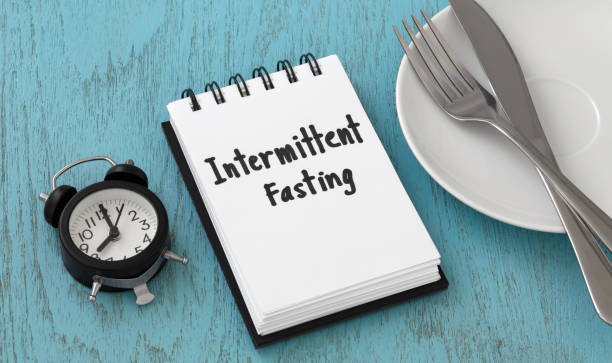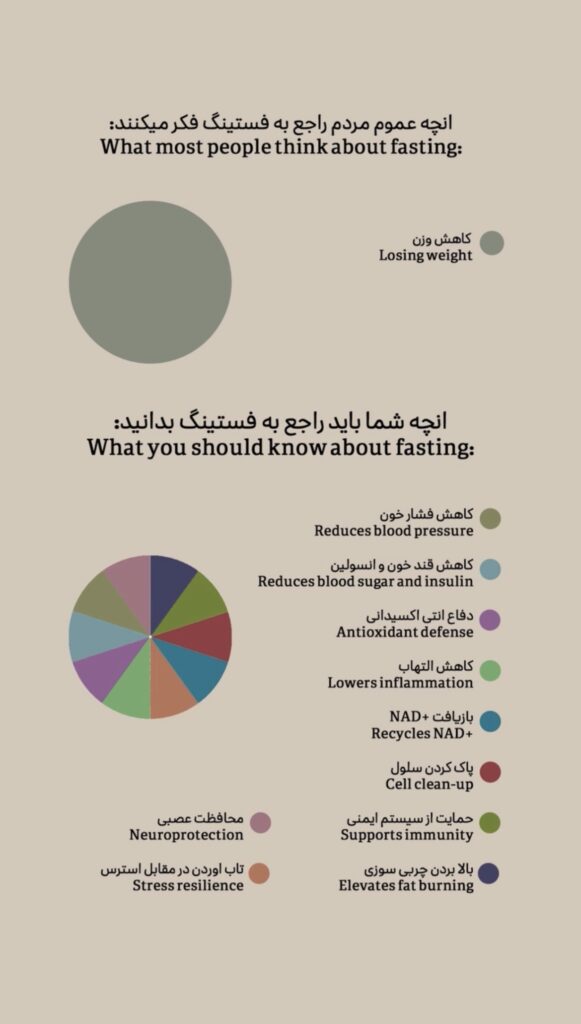
Why Intermittent Fasting?
- Maintain Optimal Health
- Lose Weight Effectively
- Reverse Diabetes Naturally
- Lower Blood Pressure Safely
- Enhance Mental Clarity
- Promote Longevity
- Boost Immunity

Why Intermittent Fasting?
Intermittent fasting is not just a diet; it’s a lifestyle. For long-term success, sustainability is key. The focus isn’t just on fasting itself but also on understanding what to eat, when to eat, and how to eat to support your health and well-being.

Is intermittent fasting only for weight loss?
Most people think of fasting only as a way to lose weight, but its benefits go far beyond that. Fasting can help reduce blood pressure, lower blood sugar and insulin levels, and support antioxidant defense. It also plays a crucial role in lowering inflammation, recycling NAD+, and cleaning up damaged cells. Additionally, fasting strengthens the immune system, protects the nervous system, improves stress resilience, and enhances fat burning. In short, fasting is not just about weight loss—it’s a powerful tool for overall health and longevity.
Benefits of Intermittent Fasting
Time from last calorie intake
4-8 Hours
- Blood sugars regulate/balance.
- All food has left the stomach.
- Insulin production is decreased.
12 Hours
- All food consumed has been burned.
- Digestive system rests.
- Full body healing begins.
- Human growth hormone increases.
- Blood sugars are completely balanced.
14 Hours
- Body has converted to using stored fat as energy.
- Human growth hormone increases dramatically.
16 Hours
- Fat burning is optimized.
18 Hours
- Human growth hormone is at an all-time high.
The effects of fasting on the internal organs of the body
Brain
- Improves sleep and mood
- Reduces alzheimer’s risk
- Increases focus and energy
Heart
- Decreases LDL
- Increases HDL
- Decreases blood pressure

Pancreas
- Insulin sensitivity
- Reduces blood sugar

Gut
- Reduces reflux
- Improves microbiome
- Reduces GI inflammation
Bone
- Reduces inflammation
- Reduces pain

Muscle
- Catabolic sparing
- Reduces pain
Five common fasting mistakes
overeating or undereating
25rushing advanced plans
40giving up too soon
20too much sugar
15- Overeating and Undereating
Fasting works miracles if performed properly but undereating won't do you any good Same goes for overeating, specially at dinner.
Focus on healthy diet and do not restrict yourself and eat until you are sated, not until you run out of food.
- Rushing advanced plans
not starting slow often lead to backsliding. start smart with beginners plans and follow the plans for a month and move to next level.
- Giving up too soon
Many give up just a few weeks in, because of various reasons, for example, starting with choosing the wrong plan and finishing with simple lack of motivation.
Fasting launches a powerful process in your body so, give it time to adjust to new lifestyle and give it time to get rid of decades long eating habits.
Too much sugar
some people just don't understand the impact of sugar. Not all calories are the same, sugar in an empty carb and it makes out bodies store more and more fat, but doesn't bring any other nutrients to us. Reduce sugar intake and you'll be amazed.
What is the best way to nourish your body after hours of fasting?
Protein consumption
Consuming protein after fasting helps maintain muscles, control appetite and stabilize blood sugar. Also, by increasing satiety and preventing blood sugar fluctuations, it prevents overeating and provides stable energy.


Adequate fiber intake
Consuming fiber after fasting helps improve digestion, control blood sugar and increase satiety. Fiber prevents extreme fluctuations in blood sugar and facilitates digestion by supporting intestinal health, thereby preventing overeating.
Consuming healthy fats
Good fats, such as omega-3 and monounsaturated fats, are good for heart health, brain health, and reduce inflammation. Its sources include fatty fish, avocado, olive oil and nuts. Consuming these fats provides stable energy and is better than harmful fats.


Not consuming sugar
Not eating sugar during fasting maintains insulin balance, increases fat burning and reduces energy fluctuations. Consuming sugar can raise insulin levels and disrupt the fasting metabolic process, causing the body to use sugar for energy instead of stored fat. In addition, sugar can intensify the feeling of hunger and make it difficult to control appetite. Therefore, it is better to avoid sweet drinks and foods and go for natural and healthy sources of energy
Why Does Weight Loss in Fasting Fluctuate?
Weight loss during intermittent fasting (IF) doesn’t happen in a straight line. Initially, you may lose weight quickly, but after a while, it might stall before dropping again. This is a natural process caused by metabolic changes in the body.
Water Loss in the Early Stages
In the first few days, your body burns through glycogen stores, which hold a lot of water. As glycogen is depleted, water is lost, leading to rapid initial weight loss.
Entering the Fat-Burning Phase
Once glycogen stores are used up, the body switches to fat burning (ketosis), but this process doesn’t happen at a constant rate.
Temporary Weight Loss Plateau
Sometimes, the body slows down energy expenditure in response to calorie restriction, causing weight to temporarily stabilize.
How to Optimize Weight Loss in Fasting?
Your First Meal Matters
Break your fast with protein, fiber, and healthy fats to stabilize blood sugar and keep you full longer.
Avoid Sugar and Processed Carbs
Eating sugar spikes insulin and halts fat burning. If you consume sugar after fasting, your body shifts back into fat storage mode.
Avoid Eating Late at Night
As the day progresses, insulin sensitivity decreases. It’s best to have your last meal a few hours before bed.
Exercise After Eating for Better Blood Sugar Control
Light activity, such as walking or resistance training after meals, helps regulate blood sugar and prevent fat storage.




No comment